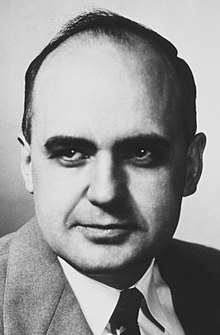Maurice Hilleman
| Maurice Ralph Hilleman | |
|---|---|

Hilleman c. 1958, as chief of the Dept. of Virus Diseases, Walter Reed Army Medical Center
|
|
| Born | August 30, 1919 Miles City, Montana |
| Died | April 11, 2005 (aged 85) Philadelphia, Pennsylvania |
| Cause of death | Cancer |
| Nationality | United States |
| Occupation | Microbiologist, vaccinologist |
| Known for | Developing several important vaccines |
| Spouse(s) | Thelma Hilleman (1944-1962, her death) Lorraine Hilleman (1963-2005, his death) |
| Awards |
National Medal of Science (1988) Albert B. Sabin Gold Medal (1997) Prince Mahidol Award (2002) |
National Medal of Science (1988)
Maurice Ralph Hilleman (August 30, 1919 – April 11, 2005) was an American microbiologist who specialized in vaccinology and developed over 40 vaccines, an unparalleled record of productivity. Of the 14 vaccines routinely recommended in current vaccine schedules, he developed eight: those for measles, mumps, hepatitis A, hepatitis B, chickenpox, meningitis, pneumonia and Haemophilus influenzae bacteria. He also played a role in the discovery of the cold-producing adenoviruses, the hepatitis viruses, and the cancer-causing virus SV40.
He is credited with saving more lives than any other medical scientist of the 20th century.Robert Gallo described him as "the most successful vaccinologist in history".
Hilleman was born on a farm near the high plains town of Miles City, Montana. His parents were Anna and Gustav Hillemann, and he was their eighth child. His twin sister died when he was born, and his mother died two days later. He was raised in the nearby household of his uncle, Robert Hilleman, and worked in his youth on the family farm. He credited much of his success to his work with chickens as a boy; since the 1930s fertile chicken eggs have often been used to grow viruses for vaccines.
His family belonged to the Lutheran Church–Missouri Synod. When he was in the eighth grade, he discovered Charles Darwin, and was caught reading On the Origin of Species in church. Later in life, he rejected religion. Due to lack of money, he almost failed to attend college. His eldest brother interceded, and Hilleman graduated first in his class in 1941 from Montana State University with family help and scholarships. He won a fellowship to the University of Chicago and received his doctoral degree in microbiology in 1944. His doctoral thesis was on chlamydia infections, which were then thought to be caused by a virus. Hilleman showed that these infections were, in fact, caused by a species of bacterium, Chlamydia trachomatis, that grows only inside of cells.
...
Wikipedia
